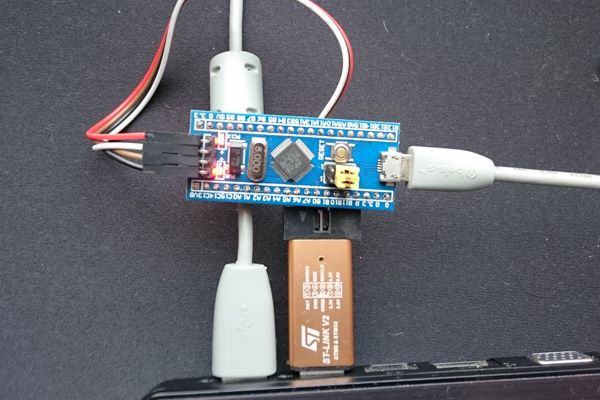Demo of the usage USBDevice library with Blue Pill STM32F103C8T6 board.
STM32F103C8T6 USBSerial Demo
This project contains demo of the USB serial usage for a cheap developer board Blue Pill with STM32F103C8T6 mcu.

The USB serial port provides a good communication channel between PC and microcontroller. Especially it can be useful for a debug purposes.
Notes
- by the specifications this board has only 64KB of the flash, but actually it can have 128KB, that will be useful for a debug builds as it requires about 100KB of the flash for this demo.
- the board can have some problems with an USB because it has wrong value of the pull-up resistor
- for steady reading of data from a serial port, the project contains python script serial_reader.py (it requires PySerial and six python libraries), that is steady to the board reloading
- the project depends on the fork of the USBDevice library. This fork contains some fixes and support of the BLUE_PILL_STM32F103C8 target.
- the mbed-os now contains correct code for a clock initialization of the BLUE_PILL_STM32F103C8 target, so you don't need to adjust the board clocks separately
serial_reader.py
- Committer:
- Konstantin Kochin
- Date:
- 2017-08-04
- Revision:
- 0:24604e97c40c
File content as of revision 0:24604e97c40c:
#!/usr/bin/env python
from __future__ import print_function
import argparse
import sys
from time import sleep
import serial
from serial.tools.list_ports import comports
from six import binary_type
_DEFAULT_BAUD_RATE = 115200
def _reset_baud_drate(serial):
original_baudrate = serial.baudrate
i = serial.BAUDRATES.index(original_baudrate)
if i == -1:
raise ValueError("Unknown baudrate {}".format(original_baudrate))
if i > 1:
tmp_baud_rate = serial.BAUDRATES[i - 1]
elif len(serial.BAUDRATES) > 1:
tmp_baud_rate = serial.BAUDRATES[i + 1]
else:
raise ValueError("Only one baudreate is available")
serial.baudrate = tmp_baud_rate
serial.baudrate = original_baudrate
def _read_from_serial_device(port, out=sys.stdout, reconnect_on_error=True, repeat_delay=2, **port_params):
print('Read from the serial port "{}" (use Ctrl+C to exit)'.format(port))
while True:
try:
with serial.Serial(port=port, **port_params) as com_port:
# hack:
# when you connect usb-com port of the stm32f1 first time, it will work
# but if you reconnect it, then it stop working, although com port readers doesn't show
# any error.
# However I found that it can be solved by 2 ways:
# - host rebooting (but it's very inconvenient)
# - changing baudrate. The new value doesn't matter, it should only be different than previous.
# Moreover the old values without any problems can be reverted without any problems.
# TODO: find reason of such strange behavior
_reset_baud_drate(com_port)
for line in com_port:
if isinstance(line, binary_type):
line = line.decode('utf-8')
out.write(line)
out.flush()
except serial.SerialException as e:
print("Error: {}".format(e))
if not reconnect_on_error:
break
sleep(repeat_delay)
def _guess_serial_device_name():
ports = list(comports())
if len(ports) == 1:
port = ports[0].device
elif len(ports) == 0:
raise ValueError("No serial devices found")
else:
print("Several serial devices are found. Please specify one of them explicitly:")
for port_info in ports:
print("- {}".format(port_info.device))
raise ValueError("Multiple serial devices are found.")
return port
def main(args=None):
parser = argparse.ArgumentParser(prog='serial_reader',
description='Helper program that read text from a serial port. '
'Unlike other com programs it automatically reconnect '
'to serial port if any error occurs. It is useful for '
'microcntrollers debugging when you want to reboot it and'
'the connection will be lost for some time.')
parser.add_argument('port', nargs='?', help='Serial port device name. It it is not specifies, then'
'it will be found automatically if it is possible')
parser.add_argument('--baudrate', default=_DEFAULT_BAUD_RATE,
help="baud rate. Default: {}".format(_DEFAULT_BAUD_RATE))
parsed_args = parser.parse_args(args)
if parsed_args.port is None:
try:
port = _guess_serial_device_name()
except Exception as e:
print(e)
sys.exit(1)
else:
port = parsed_args.port
try:
_read_from_serial_device(
port,
baudrate=parsed_args.baudrate
)
except KeyboardInterrupt:
print("Exit ...")
if __name__ == '__main__':
main()
 Konstantin Kochin
Konstantin Kochin